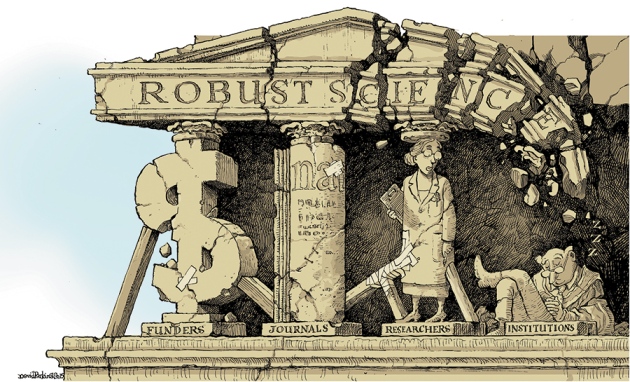I have been engaged in an argument with a rather tedious athei-bot over at Religion Disptaches, he's one of the Jesus-deniers of the "Jesus is a myth" variety. I have to admit that I've never taken those folks any more seriously than I do young-earth-creationists or climate change deniers so I never addressed them before except to note that one of their very own, Bart Ehrman has told them, in the plainest of terms that, like it or not, there is no serious historian with the requisite scholarly equipment who doesn't accept that Jesus was an actual person who lived in roughly the time and place that the Gospels describe.
The argument made to me is the one that the Gospels all date from decades after Jesus died and that the earliest mentions of Jesus, in the Epistles of Paul don't mention much if any of the material contained in the Gospels. Why they never include the Epistle of James, generally considered the oldest of the books of the New Testament, I'm not sure. But one thing is clear, these guys are parroting some atheist propaganda on the topic, they haven't even bothered reading the earliest of the Pauline Epistles, such as Galatians, which scholars date as being written sometime between c. 49 and 55 CE. It is generally believed that Paul was writing to one of the many communities of Christians he had founded in his many, long years of missionary work, spreading the teachings of Jesus and the belief in him and his teachings.
If the atheists who buy the current debunking argument had bothered to read the Epistle instead of what their alleged atheist experts say about it, it contains nothing but bad news for their effort. As soon as verse 6 of the first chapter of Galatians Paul is talking about the existence of a true Gospel which he had given them and a false Gospel which is at variance with it. Now, from Paul's own writing we now know that as early as the 50s CE there were Gospels about Jesus circulating among Christians, how much those Gospels coincide with the four canonical Gospels we have now isn't knowable but it is certainly not unreasonable to believe that much of the same material, the same teachings of Jesus and accounts of his life were contained in them. The earliest dated Gospels, Mark and Matthew are often estimated to date from the 50s and not later than the 60s CE and what we have now are believed to have been based on either earlier editions of the same books or to have consulted earlier Gospels. Matthew and Luke, along with Mark have all been gone over exhaustively, comparing both material common to them and not common to them to try to discern those issues. The speculative Gospel they consulted, the so-called Q (from the German quelle, source) could have been exactly what Paul was talking about.
If the Gospel that Paul was talking about was in the oral tradition or written down is not known but, as it's obvious that accuracy was important to Paul AND IT'S OBVIOUS THAT HE WAS WRITING TO LITERATE PEOPLE, it's almost certain that the Gospel he was talking about would have been written down, perhaps even checked for accuracy by those who he gave it to. I can't imagine that literate people who had been moved to convert to Christianity wouldn't have taken down in writing what they'd been told, if he had been able to write it out himself, I can't imagine Paul wouldn't have written things down for them. And, as Paul was not the only person spreading the word, other Christians, many of whom, unlike Paul, would have heard Jesus and even known him would have had as much of a reason to have written sayings and accounts down, as well.
I don't understand why these would be debunkers think that the lapse of time between the death of Jesus, in the early years of the 30s CE, and the earliest written accounts we have of his life are some big problem. The time periods descried in short accounts you can read in twenty minutes amount to years and decades. Those consisted of months and weeks when things happened. Consider what a time line would show in the case of Paul.
From the time of the execution of Jesus we have the account of his resurrection, a period of regathering his followers who witnessed his Resurrection before his ascent into heaven and, then a period before the Pentecost event which might count as the beginning of Christianity. Even if you don't believe in the Resurrection, the Ascension or the Pentecost, the earliest written records give a space of time between the execution of Jesus and the beginning of the movement of those who believed in him and in those events, including those who believed they were witnesses who experienced them.
By the time of the conversion of Paul from being a persecutor of the followers of Jesus to a latter day apostle of Jesus, we already have accounts of, not only a Church in Jerusalem but in other places. That certainly accounts for a number of years of development, first the community forming and then, after that existed, the organized persecution of the Church. Those things are also talked about by Paul and in the book of Acts estimated to date from the early 60s CE. And there is, as well, a period of time between the conversion of Paul and the writing of his earliest letters to communities he had established and which he feels are in need of correcting due to their straying from the Gospel he had given them. It's as if the 21st century atheists have no patience to understand that life in the 1st century was not like it is today where you text someone or call them on your I-phone or even send them a letter on cheap paper written in ball-point pen, sent by reliable air-mail (an act that is so cumbersome and labor intensive so as would exhaust the patience and comprehension of a lot of these callow atheists, it would seem).
The time from Paul's conversion to his first Epistles has been estimated to be as long as 17 years, including extensive and arduous travels, staying in places long enough to convert people and establish communities, to run into opposition and get into trouble, have a major dispute with the leaders of the Church in Jerusalem which had to be sorted out, more missionary trips, etc.
Paul, knowing he had given these people the Gospel would not have gone over what he knew they had in a letter written, probably with a reed pen dipped in ink on very expensive paper, to be sent to them by arduous and far from reliable means. He knew they had the Gospel he had given them, there would be no reason to go over it again. He was dealing with specific issues that arose after that.
And Paul, by his own admission, had never known Jesus in life. He, himself, would have to rely on the witness of those who had known and seen and heard Jesus for accounts of those things. He, himself, asked the Church in Jerusalem for their blessing for his missionary work, naming James, the brother of Jesus and Peter, certainly the same Peter who is one of the closest associates of Jesus in the Gospels, he must have relied on them for direct knowledge of what Jesus said and did. I wouldn't be surprised if he had not transmitted much of the information he had as he had been told it by them and others, unnamed, followers and associates of Jesus. I would be surprised if he hadn't included such information in the Gospel he had transmitted to those early communities.
The alleged time gap that the Jesus mythicists rely on is, actually, no gap at all. It is entirely understandable that a small and rapidly growing movement of Christians, whose central figure was executed as a criminal, whose teachings were radically in favor of the poor, the destitute, the outcast and the alien and which excited a violent crackdown wherever it was announced would have a hard time organizing their written and oral accounts of what they were about. Especially in that age when writing was not even as easy as it was with steel pens or lead pencils on cheap paper in the 19th century.
Everything about the new atheism is anachronistic, a failure of understanding and an ability to accurately imagine the conditions under which Christianity began. Considering those conditions and the forces that would have to be overcome for Christianity to have become a real and dynamic movement, its survival and spread, even in the period before the catastrophic adoption of it as the Roman state religion, could be legitimately regarded as miraculous. What isn't so miraculous is that the very documents that such debunkery rests on are the things which support the reality of Jesus and his teachings. You have to pretend what's in them isn't there to do what the atheists want to do with them. Which doesn't surprise me, not after seeing what they have to do to maintain some of their central myths. But I won't go into the post-war St. Darwin myth or the heroic history of Marxism in America again just now.
To demand modern record keeping in the 1st century Mediterranean basin is as clueless as it would be to demand a full family tree of our ancestors in the Paleolithic period. One of the most ridiculous aspects of the present atheist polemic around these issues is that the very same people will buy the most clearly opportune and even absurd myth making about our ancestors based on absolutely no evidence, whatsoever. So many of them are the truest of believers in whatever some evo-psy guy makes up out of not even the thinnest of air but out of sheer and naked opportunism as having the reliability of science. Clearly what they admit as evidence depends on what they want to be true, not what is there and what isn't.
I think the primary motive of the current attempt to lie about the existence of Jesus is a hostility to his teachings of radical egalitarianism, including a requirement to share, equally, available resources. I am ever more convinced that what is beneath the attempt to bury the reality of Jesus by denying he was real is the same as those on the political right in burying the radicalism of the real Jesus with a phony substitute who was worried that men might sleep together above all else and that you are to shoot unto others before they can shoot unto you. Their motives are exactly the same, inequality, acquisitiveness, feeling better about yourself through hating other people. There's nothing in the Gospel that they welcome, that they have any intention of living by.
Update: Simels apparently finds the word "perhaps" to be more complex than he's able to navigate. I'd publish but we've already established that he's a post-literate kind of Brain Truster.




No wonder you loved that "Icarus" by Oregon. You don't recognize proto-New Age when you hear it.
"My brother corrects me that it wasn't Weather Report who played Icarus, it was Oregon, another group I wasn't that hot on. They were all right but I liked Ralph Towner's work with other musicians better."
A life in pop music not only makes you insensitive to music of any sophistication or complexity, a life in pop music scribbling has made you illiterate as well. Or is that a result of remaining at Duncan's Brain Trust as the adults fled in droves?